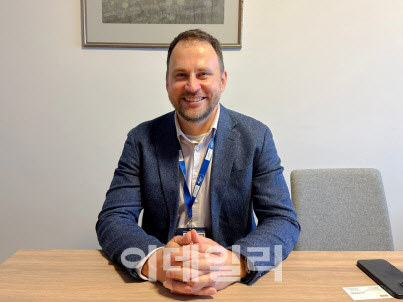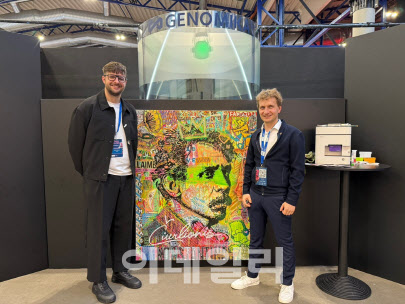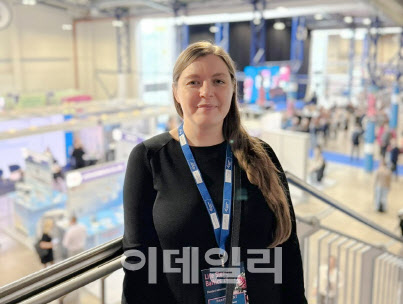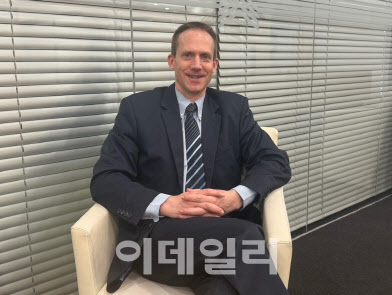[Vilnius(Lithuania)=Lim Jeong-yeo] Life Sciences Baltics 2025, Lithuania’s biggest event in the area held biennially in the capital city of Vilnius, brought together the nation’s household names to fore. Edaily, the only media from South Korea to attend this unique event, had the chance to speak to a select four local biotech companies.
 | | Giedrius Gasiunas, Co-founder, Board member, and CSO at CasZyme(Cred=Lim Jeong-yeo) |
|
CasZyme, pioneer in CRISPR-Cas, preparing for clinical stage CasZyme, founded in 2017, is Lithuania’s representative gene editing platform technology company. It was co-founded by Professor Virginijus Siksnys of Vilnius University --renowned for his achievements in CRISPR-Cas “genetic scissors” research -- his student Dr. Giedrius Gasiunas, and strategy expert Dr. Monika Paule.
CasZyme owns a collection of more than 80 Cas protein variants. Its Cas12I platform is notable for being completely distinct in sequence from other Cas12 proteins, with a smaller size of 850 amino acids, compared to the traditional Cas9’s 1,368, making it more versatile in applications.
From its early days, CasZyme has partnered with strategic partners such as Corteva and New England Biolabs for complementary expertise. It has secured a cumulative €90 million (about KRW 147.8 billion) in public research funding, and has largely remained self-sustainable through providing contract research services. CasZyme is planning for its first large-scale private fundraising and mulling a potential IPO to advance its proprietary retinitis pigmentosa therapy pipeline into human clinical trials. The valuation was not disclosed. There are 26 people currently employed at CasZyme.
CasZyme is one of the few Lithuanian life sciences companies with pre-existing ties with South Korea. Since 2021, CasZyme has been collaborating with South Korean gene editing technology company nSAGE on diagnostics development. Chief Scientific Officer Gasiunas told Edaily, “An acquaintance at South Korea’s ToolGen has lead to an introduction with nSAGE. We maintain an active partnership with nSAGE in the field of Cas enzyme development.”
 | | Lukas Zemaitis, Co-Founder of Genomika(right) and Robertas Skliaustas, Head of business development at Genomika(Cred=Lim Jeong-yeo) |
|
Genomika, DNA as the next-generation data storage device Genomika is tackling the era of data inundation with DNA-based information storage technology. Co-founder Lukas Zemaitis told Edaily, “Nature has been storing information in DNA for over billions of years. By converting digital data from binary (0, 1) into quaternary code (A, T, G, C), synthesizing it into DNA strands, and storing them in a protected environment, we can safely preserve any type of digital data, be they photos, videos, music, text, for extremely long periods.”
Robertas Skliaustas, head of business development, added, “By the end of this year, global data volume is expected to reach 181 zettabytes (1 zettabyte = 1 billion terabytes). About 6% of that is archival, meaning data that must be stored but rarely accessed. This is where Genomika’s DNA storage technology can come highly useful.”
He explained: “DNA has a diameter of 5 nanometers and can store 1.07 billion terabytes of data in just 1 cm³. Electronic storage devices like hard drives, SSDs, and HDDs have reached the limits of how small they can get. The true next-generation storage medium will be biological.”
He further noted, “Cloud storage requires massive data centers consuming huge amounts of space, water, and electricity, and as data grows, more centers must be built, impacting the physical world. By contrast, DNA can preserve data for tens of thousands of years without requiring energy.”
Currently, encoding 1 megabyte of data into DNA costs about $10,000 (KRW 14 million), but the price will fall as adoption grows. The company’s goal is to reduce this cost to just $1 per megabyte.
Founded in 2019, Genomika has operated on grants and contract research. In 2023, it secured €5 million (about KRW 8.3 billion) in grant funding and now employs 10 staff. It is the only Lithuanian company to pursue DNA storage technology and its global competitors include France’s Biomemory and U.S.’ Atlas Data Storage, a spin-off from Twist Bioscience.
 | | Neringa Seperiene, Co-founder and CEO at BrachyDOSE(Cred=Lim Jeong-yeo) |
|
BrachyDOSE, precision measuring of radiation doses to minimize cancer therapy side effects In the medtech category, where Lithuania is strong, BrachyDOSE was co-founded in January 2024 by CEO Neringa Seperiene. It has raised €554,000 (about KRW 900 million) in seed funding, led by Coinvest Capital of Lithuania, with participation from BSV Ventures and angel networks LitBAN and EstBAN.
BrachyDOSE, which until recently offered R&D services such as 3D printing to hospitals, is now in the process of commercializing its first proprietary product: a tube-shaped sensor. This thin, rod-like sensor measures treatment outcomes for cancer patients undergoing brachytherapy. Brachytherapy, or “internal radiation therapy,” involves inserting radioactive isotopes directly into a tumor to destroy cancer cells. Unlike external beam therapy, it maximizes the effect on the target site while minimizing damage to normal tissue.
The BrachyDOSE sensor issues warnings via a machine-learning-driven decision-support algorithm if there is a mismatch between prescribed and delivered radiation doses. It also predicts the likelihood of injuries, wounds, and treatment outcomes. This data helps prevent errors during treatment, lowers hospitals’ overall treatment costs, and saves times for medical staff.
CEO Seperiene said, “By using BrachyDOSE tubes, medical staff can improve time efficiency by 50%, reduce patient treatment costs by 25%, and shorten hospital stays by 3 to 5 days. Our priority focus right now is in European market but in the long-term prospect we hope for collaboration opportunities with South Korea as well.”
 | | Andre Markmann, Vice President of Business Development at Northway Biotech(Cred=Lim Jeong-yeo) |
|
Northway Biotech, leveraging Lithuania’s central European location as a niche CMO Northway Biotech, a flagship biomanufacturing company in Lithuania, was founded on production expertise and successful M&A experience by Professor Vladas Algirdas Bumelis, a former senior executive at Sicor Biotech, which was acquired by Teva.
In 2004, Northway established a cGMP facility in Vilnius for producing protein-based biologics such as antibodies. In 2020, it expanded its production capacity to Boston, U.S., and since September 2024, it has been operating a cell and gene therapy (CGT) manufacturing facility in Vilnius with capabilities in plasmid DNA and AAV viral vector production. This marks the Baltic region’s first CGT manufacturing facility and is the initial unit of “BioCity II,” a 8,000 m² complex under construction with a planned €7 billion (KRW 11 trillion) investment through 2030.
Andre Markmann, VP of Business Development, told Edaily, “South Korea is an example of how a small country can achieve big things,” implying that this inspires Lithuania, which is also a relatively small nation in size.
He added, “Northway Biotech, based in Lithuania which is in the geographic center of Europe, can provide production services for overseas biotech companies planning European clinical trials. Our production capacity is versatile from as small as 10 liters up to 1,000, 2,000, and 4,000 liters. We offer end-to-end services from cell line development to drug substance (DS) and drug product (DP). So far, we’ve worked with 90 clients, 70% from Europe and 30% from the U.S. We’re in talks with potential Korean biotech clients as well.”